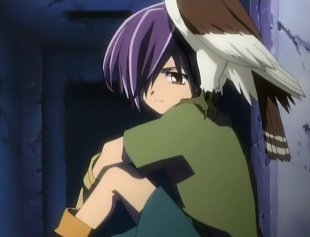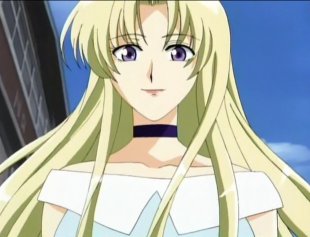This is Norse Mythology?
A Closer Look at Loki
Trust me, when it comes to learning, this particular girl isn't always on the edge of her seat. However, when it comes to the origins of an anime, this fangirl will actually take time out of her schedule just to find out more. Recently, I have gotten my hands on a rather amusing anime called Matantei Loki - Ragnarok or Mythical Detective Loki - Ragnarok for those of us that don't know Japanese. The story was actually inspired by Norse mythology, and several gods and goddess' make an appearance. But how far is "Loki" from it's roots? I've done some digging and have made some interesting discoveries.
Click on the character you would like to learn more about:
 | Loki was most commonly known as the god of deceit and chaos. It was said that he was a blood brother to Odin, and that due to that no one dared to keep him from causing trouble. He even managed to get Hodur (a god) to kill his brother Balder. Another popular trait is that he was a shape-shifter, which is probably the reason why some of his offspring weren't human (Midgard the giant snake and Fenrir the giant wolf, for example). In the anime, however, Loki is seen as your typical nice guy. As a punishment (for what, they haven't told us yet), he is cast down to earth by Odin in the form of a little boy. Also, instead of no one touching him, every god (sans Thor) comes to earth for the purpose of destroying him. One of the similarities is that the two previously mentioned offspring are included in the anime, only they are mostly in disguise (as Yamino the butler and a small black dog, respectively). Another is Loki's appearance when he is in his true form. He was often discribed as having red hair, eyes, and clothes, though the eyes only flash red when he's doing magic in the anime. He also still has his shape-shifting abilities, turning into a gerbil in one episode, his eyes remaining the same as in mythology. |
| Thor was the god of thunder, agriculture, and free men. His hammer, Mjollnir, was magic and it returned to him when he threw it like a boomerang. He was known as a very powerful god, yet he could be dim-witted at times. Thor is probably the character in the anime most closely tied to his roots. Instead of a hammer, however, he carries around a kendo stick, often saving people in the name of justice. He can be simple-minded as well, deciding to turn right in one episode simply because he was right-handed. Another thing that can be tied in, though rather loosely, is his skill when it comes to cooking and eating. In every episode he has a new part time job, each at some sort of eatery. And, if you want to go this far, his "chariot" (that in mythology is drawn by two goats and creates thunder) is often in the form of a noodle cart which he himself pulls, though that may be pushing it a bit. |  |
 | Heimdall was the god of dawn and light. He was the watchman of Bifrost, the rainbow bridge which connects Midgard and Asgard, two of the nine worlds in Norse mythology. It was said that he had incredible eyesight and hearing and that he needed less sleep than a bird. Also, he was supposed to be a clever god with a "second-sight" for looking into the future. In the anime, I don't even think the bridge is mentioned and his sight and hearing are only ever so slightly hinted at in the form of the falcon that accompanies him. There is also no indication that he can see the future. And perhaps the biggest difference is the fact that in the anime, Heimdall accuses Loki of stealing his right eye, which, the closest thing I could find to that was Odin giving his right eye away, not Heimdall. I believe this was added to create a greater friction between Heimdall and Loki, who, in Norse mythology, are supposed to battle and kill each other at Ragnorok, the final battle. |
| Freya is the goddess of love and fertility. She was said to be exceedingly beautiful and had many men (and giants and dwarves) fall in love with her. She apparently had a knack for witchcraft and taught the gods about charms and potions. Another interesting trait was her love for battle. Her role in the anime is different, however. She is portayed as being a former lover of Loki, and for that is sent to earth as a child, like Loki, only in her child form she remembers nothing of who she is. In mythology, practically her only connection to Loki was when she lent him a falcon skin. However, she does retain her knack for potions (in episode 20 she baked treats that did things like put you to sleep or made you dance until you die when you ate them) and love for battle (in a few episodes she has a sword and in another she accidentally enters an arena of sorts and defeats everyone there). Also, her Brising necklace plays a rather large roll in episodes 6 and 7, though I'm doubting it had the same powers as in the anime. |  |
Other characters appear as well, such as Freyr (Freya's brother) and his "boar" (mechanical pig), Gullinbrusti, the Norns which are the same as the Fates, and of course Odin, who we don't know too much about at this point in time. Also, several items that each character has in mythology shows up as well, like Freyr's boat, Skidbladnir, or Yggdrasil, the world tree that connects all nine worlds together. However, the biggest question has to do with the title of the anime itself: Ragnarok.
Ragnarok, in Norse mythology, [is] the doom of the gods. According to prophecy the end of the world would follow a severe ice age, in which human civilization would be destroyed. Then the gods of Asgard, led by Odin, would clash with the devastating forces of evil and chaos, led by Loki and the giants. After a fierce battle the universe itself would be destroyed by fire and a new golden age would appear, ruled by the surviving gods.
It is said that Heimdall will be the one to announce the coming of Ragnarok by blowing his horn, and that in battle, he and Loki will kill each other. And since this is the ultimate battle between good and evil, it is basically saying that Odin is the "good" and Loki is the "evil". This is already in direct conflict with the anime. In it, Loki is seen as "good" and Odin is "evil", or at least that's the impression that we get from Heimdall who is under Odin. So is the "Ragnarok" in the title merely to make us think that the world will end in episode 26? And if it will end, how will this come about? There are so many things different from mythology pertaining to Ragnarok that the only thing to do is sit and wait for the last episode to air.
Note: I myself have seen 23 of the 26 episodes and am basing my thoughts on that. I wish 24 would hurry up and start downloading! >_<
Sources:
Sites about the anime:

The official Matantei Loki - Ragnarok website
(site no longer available)

Destination Ragnarok
(possibly no longer updated)

Heaven's Door
(site no longer updated)
Questions or comments? Feel free to send Gwydion a note.
Disclaimer: I do not own "Loki" or any characters from "Loki". All the information above was researched by me and can be found through the above links. The screenshots, however, were taken by me and I would appriciate credit if you wish to use them. This includes the background.


